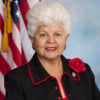
Rep. Grace Napolitano
Candidate for Congress, District 32Behavioral health affects everyone. For example, 1 in 5 children and adolescents suffer from some form of behavioral and mental illness. And many of our brave military service members suffer from Traumatic Brain Injury and Post Traumatic Stress Disorder. Today, more people die from suicide in the United States than from traffic accidents or homicides, and we lose 22 veterans to suicide daily.
Most behavioral health issues go untreated because individuals either cannot afford care, lack access, or do not know anyone they can turn to for help. Stigma associated with behavioral health issues is a huge contributor as well. Investing in preventive behavioral and mental health will give our family members, neighbors, colleagues and loved ones a better future. Without help, those with behavioral illnesses are more likely to fall victim to crime, drugs, imprisonment, or suicide. Speaking out to raise public awareness and eradicate stigma associated with behavioral health is critical.
As a Member of the United States Congress, I fight every day to bring critical federal financial resources to the state of California and work with local health care professionals and entities like Entertainment Industries Council (EIC) to raise awareness and reduce stigma associated with behavioral health.
I have established a locally based mental health consortium working group which meets quarterly per year and work to address and improve behavioral health in the San Gabriel Valley and beyond.
This consortium works together to meet and network with behavioral health officials to address the needs of residents from all walks of life. The state of veterans’ mental health is one of the Consortium’s top concerns, as our heroes are returning with Post-Traumatic Stress (PTS) and Traumatic Brain Injury (TBI). We must prioritize services as a community: reach out to our veterans and their families, let them know of our support, and remind them it is always okay to seek help.
Unfortunately, because of the stigma associated with behavioral illness, many people are too ashamed or embarrassed to seek the help they need for themselves or their loved ones. As co-chair of the Congressional Mental Health Caucus (which includes work on behavioral health), I work with my Republican co-chair each day to hold legislative briefings and press events to raise awareness and help break through that stigma.
We express compassion for those who struggle with behavioral health issues, and we draw attention to the proven methods that can help change their lives for the better. For more information on these legislative events dating back to the past decade, please visit my website at: www.napotitano.house.gov/issues/mental-health
In the 32nd congressional district which I represent, we have gained momentum and have seen results in addressing behavioral health through the local Mental Health Consortium which I established, by collaborating with our local behavioral health providers and community leaders. This model can and should be implemented in communities throughout our state of California.
I also have and will continue to support state propositions like Prop. 63 which is critical for local counties to receive the funds they need for personnel and other resources to address behavioral health throughout our communities.
I have always and will continue to embrace behavioral health as a priority in the U.S. Congress. In 2003 I founded the Congressional Mental Health Caucus and have served as a co-chair each year since. With a Republican co-chair, I work to promote legislation that help reduce behavioral health stigma, holding several congressional hearings and briefings annually and enacting legislation into law, such as securing mental health parity in the Affordable Care Act.
After learning one in three Latina adolescents (ages 9-11) had contemplated suicide, in 2001 I secured federal funding to create a pilot program to provide on-site, culturally and linguistically appropriate mental and behavioral health services and suicide prevention services for students.
With assistance from LA County Mental Health, this program, which began in four schools has now expanded to 29 schools throughout the San Gabriel Valley and Southeast LA County. It now serves as a model for H.R. 2913, the Mental Health in Schools Act.
After the tragic Newtown shooting, in 2013 I was appointed to serve as vice-chair of the House Democratic Gun Violence Prevention Task Force to ensure behavioral health remained a critical part of the conversation on gun violence prevention.
I remain committed to continuing to reduce the harmful stigma related to behavioral and mental illness and educating public officials, communities, and families on warning signs and symptoms and that it is ok to seek help.
